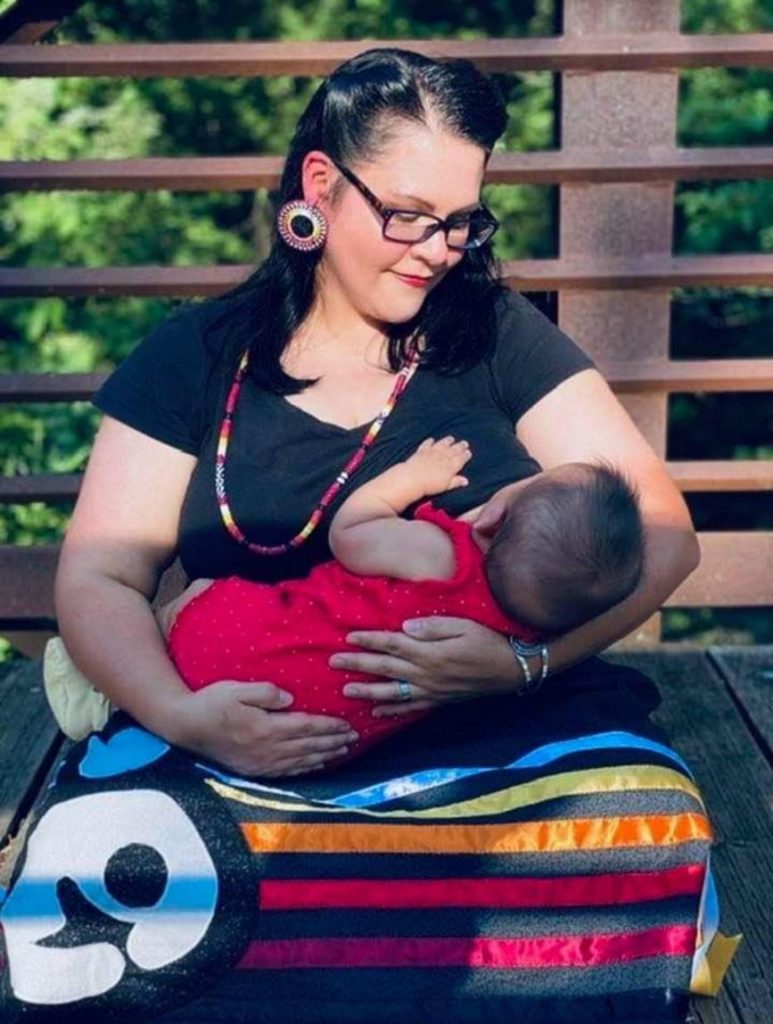By Brenda Bandy, IBCLC
Co-Executive Director, Kansas Breastfeeding Coalition
Oct. 1, 2022
The research is clear. Breastfeeding is one of only a handful of things a person can do over their lifetime to lower their risk of breast cancer.
In general, the benefits of breastfeeding are “dose-dependent”. Meaning the more months a person breastfeeds over their lifetime, the more the risk of breast cancer is lowered. Women who breastfed for a lifetime total of over two years experienced about twice the benefit of those who breastfed for a total of one year. Lifetime total refers to the total number of months a person breastfed one or more children over the course of their life.
There is one population for which this connection is even more important – Black women. Black women have lower rates of breastfeeding[1] and higher rates of triple-negative breast cancer compared with white women. For Black women, breast cancer is the second-leading cause of cancer death and they are 41% more likely than white women to die of the disease.
How does breastfeeding prevent breast cancer?
Breastfeeding reduces a person’s lifetime number of menstrual cycles and therefore their cumulative exposure to certain hormones. It is also thought breastfeeding directly affects breast cells. Lactation causes breast cells to differentiate, or “mature”, as the normal course of a woman’s reproductive life. When a woman does not experience lactation, her breast cells remain in their undifferentiated state. It is thought these “immature” breast cells are more easily transformed into cancer cells.
Yet many people remain unaware of the connection between breastfeeding and reducing the risk of breast cancer. In a 2018 study[2] of 724 breastfeeding women, only 56% of women were aware before their most recent childbirth that breastfeeding reduced the risk of breast cancer. Of these women, only 17% received this information from healthcare providers. Equally surprising is that among women who did not breastfeed, 59% responded that awareness of breast cancer risk reduction would have influenced their decision to breastfeed. This demonstrates that when a person is aware of this connection they may make choose to breastfeed and perhaps continue to breastfeed for longer.
What are the rates of breastfeeding in KS?
Nearly 90% of new parents in Kansas start out breastfeeding, but only 58% are still breastfeeding 6 mos. later and even fewer are breastfeeding without additional foods or supplements. Breastfeeding rates are even lower among younger parents, Black and Native American families, and those with low income. It is not because these families don’t want what is best for their baby. Breastfeeding may simply not be a choice for some families. They may have to return to work too soon after childbirth. They may lack access to skilled lactation support. If there is a lactation consultant nearby, they may not have transportation or time off work to see them. We must carefully consider all factors that make it difficult for families to be able to choose to breastfeed and to continue once they start.
Solutions –
- Raise awareness about the connection between breastfeeding and lowering the risk of breast cancer so more individuals will choose to breastfeed and will seek help when needed to continue breastfeeding. This can be done through:
- Distributing patient education materials such as the KBC’s handouts on this topic in English & Spanish
- Health care providers talk with pregnant individuals about how breastfeeding reduces the risk of breast cancer using the Provider handout from the Kansas Breastfeeding Coalition (KBC)
- Talking about lactation history during mammogram screening intake and adding this to screening forms
- Support the nearly 90% of families in Kansas who breastfeed:
- Parents – find breastfeeding help near you at the KBC’s Local Resource Directory
- Everyone – encourage and support breastfeeding families in your community where you work, worship, and live.
- Resources for Black families:
- African-American Women: Reduce Your Risk of Breast Cancer by Breastfeeding (video, 4 mins.)
- Breastfeeding and Breast Cancer Risk Reduction: Implications for Black Mothers
- Promoting Breastfeeding to Help Reduce Breast Cancer Risk in African-American Women
- #BlackBreastsMatter: Process Evaluation of Recruitment and Engagement of Pregnant African American Women for a Social Media Intervention Study to Increase Breastfeeding
[1] https://ksbreastfeeding.org/our-work/racial-equity/
[2] Akaansha Ganju, et al, Learning, Life, and Lactation: Knowledge of Breastfeeding’s Impact on Breast Cancer Risk Reduction and Its Influence on Breastfeeding Practices. Breastfeeding Medicine. Dec 2018.651-656.http://doi.org/10.1089/bfm.2018.0170
Photo Source: United States Breastfeeding Committee

